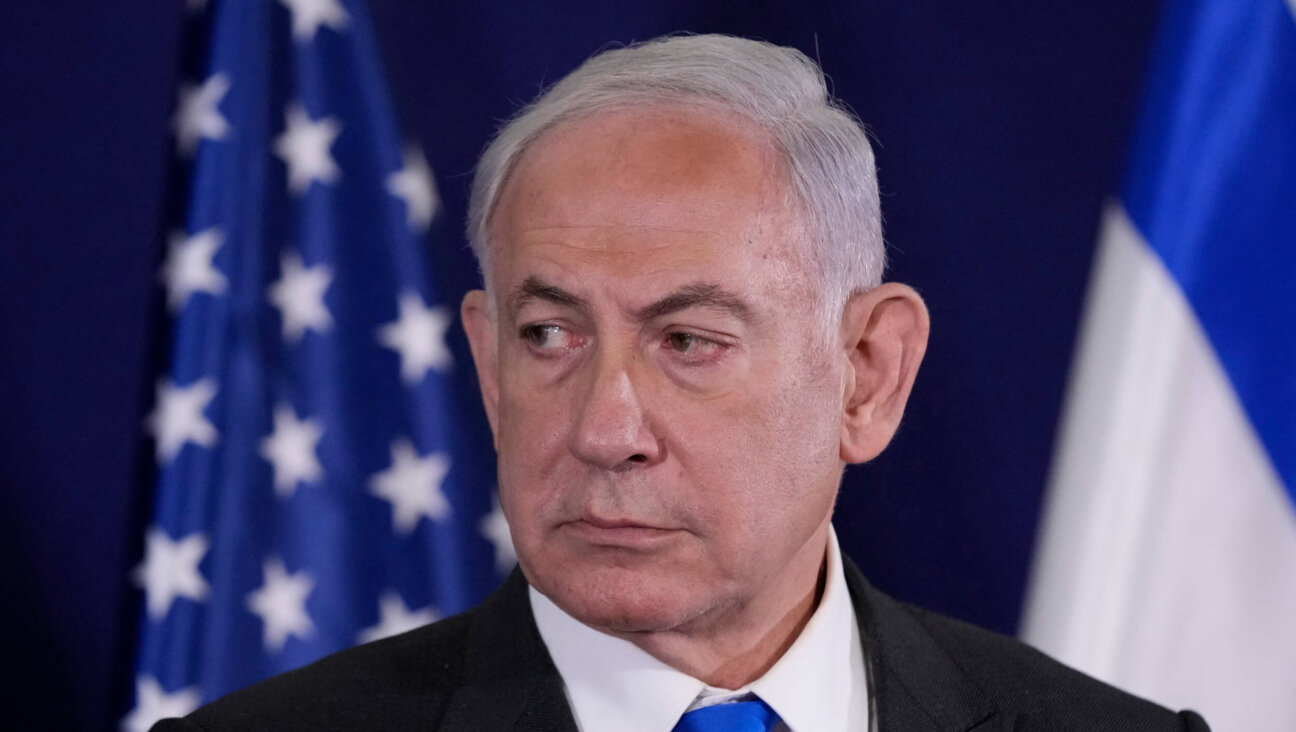Bibi’s New Settlement Plan: Just Talk, Not Action

Shas chairman Aryeh Deri, January 2013 Image by Getty Images

John Kerry and Benjamin Netanyahu, Jerusalem, May 23. Image by Wikimedia Commons
Israel’s latest announcement of permits for 1,200 new housing units in the West Bank and East Jerusalem has stirred a hornets’ nest of angry responses. Palestinian negotiator Saeb Erekat said it could undermine the negotiating process before it’s even started. State Department spokeswoman Jen Psaki said America does “not accept the legitimacy of continued settlement activity” and had communicated its “concerns” to the Israeli government. And Haaretz diplomatic correspondent Barak Ravid wrote in a scathing blog post today that Bibi Netanyahu still hasn’t decided whether he’s ready to “cross the Rubicon.”
The 1,200 units cleared for developers’ bids by the Housing Ministry are only one in a series of provocative moves in the last week. The Defense Ministry’s West Bank Civil Administration announced last week that 878 new units have received the second stage of clearance. And the cabinet voted August 4 to put 90 settlements, including four formerly illegal outposts, on the “national priority” list of 600 communities eligible for government grants, tax breaks and more. Haaretz’s Barak, quoting a “senior Israeli official close to the prime minister,” wrote that “on one hand,” Netanyahu
has stepped into the water and started marching toward the other bank. But on the other hand, he is looking back every few seconds, and for every step forward, he is allowing the current to push him back three steps.
Only the settler news service Arutz Sheva-Israel National News seems to have noticed that nothing actually happened. The new settlement announcements are just that—announcements, the service notes disapprovingly. Turning the talk into action requires a great many interim steps. Here’s how it breaks down:
The 1,200 units cleared for market are all in Jewish neighborhoods in East Jerusalem or in major West Bank settlement blocs slated for retention in a land-swap peace deal. In fact, Ravid reports in Haaretz that those units were cleared in advance in private conversations with Kerry. The 878 units that passed their second clearance still have to clear environmental and legal reviews, wait through an open period for possible court challenges and then must receive a personal go-ahead from the prime minister himself. As such, they’re not necessarily incompatible with the rumors that Bibi promised Kerry a “silent” settlement freeze, even though the atmospherics are hardly helpful in building trust.
As for the national priority list, that’s a bit more substantial. The cabinet vote means that the 90 settlements are eligible for government benefits as soon as the new fiscal year begins. A dovish Knesset member in Bibi’s coalition told me last week that while the new construction announcements are basically political gestures by Bibi to cover his right flank while he proceeds with negotiations, the priority decision is “deplorable.”

Shas chairman Aryeh Deri, January 2013 Image by Getty Images
The cabinet approved the priority list without opposition, but four ministers abstained: Justice Minister Tzipi Livni and Environment Minister Amir Peretz, both of Livni’s Hatnuah, and Health Minister Yael German and Science Minister Yaakov Peri, both of Yesh Atid.
However, a Supreme Court challenge to the plan was announced after the cabinet meeting by Aryeh Deri of the Sephardic Haredi Shas party. Deri called the decision “obtuse” and “immoral” for channeling benefits to isolated settlements deep inside the West Bank while removing large, poor Haredi communities from this year’s priority list.
Separately, the left-wing Meretz party filed a request with the state attorney general to investigate the legality of slating for benefits settlements that were built illegally and only legalized after the fact.

I hope you appreciated this article. Before you go, I’d like to ask you to please support the Forward’s award-winning journalism this Passover.
In this age of misinformation, our work is needed like never before. We report on the news that matters most to American Jews, driven by truth, not ideology.
At a time when newsrooms are closing or cutting back, the Forward has removed its paywall. That means for the first time in our 126-year history, Forward journalism is free to everyone, everywhere. With an ongoing war, rising antisemitism, and a flood of disinformation that may affect the upcoming election, we believe that free and open access to Jewish journalism is imperative.
Readers like you make it all possible. Right now, we’re in the middle of our Passover Pledge Drive and we need 500 people to step up and make a gift to sustain our trustworthy, independent journalism.
Make a gift of any size and become a Forward member today. You’ll support our mission to tell the American Jewish story fully and fairly.
— Rachel Fishman Feddersen, Publisher and CEO
Join our mission to tell the Jewish story fully and fairly.
Our Goal: 500 gifts during our Passover Pledge Drive!

























